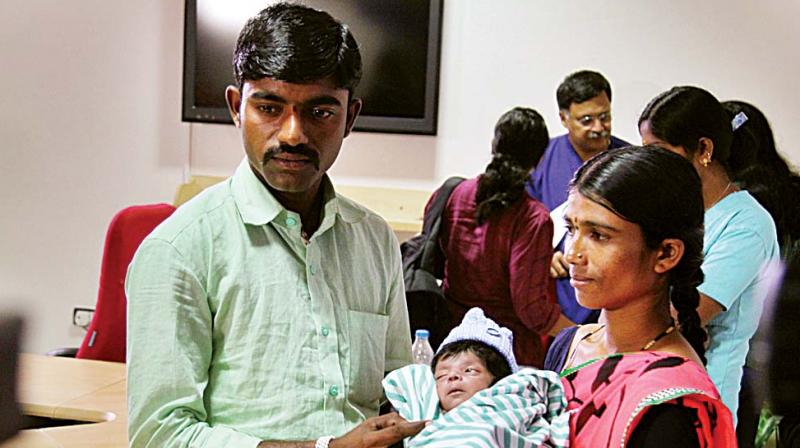Bengaluru: 4-hour long surgery to correct infant's abnormal features
It was born with extra pair of legs and two genitals.

Bengaluru: For Chennabasava and his wife from Raichur, it came as immense relief after a corrective surgery was conducted on their newborn, who had an extra pair of legs and two genitals, at a city hospital.
The baby was born on January 21 at the Dhadeasugure Primary Health Centre (PHC) in Raichur and was placed in neonatal care at Vijayanagara Institute of Medical Sciences (VIMS) in Ballari.
The baby was admitted at Narayana Health City on January 24. "We had offered to bear the surgery cost," said Dr Sanjay Rao, Senior Consultant Pediatric Surgeon at Narayana Health City.
The four-hour-long corrective surgery successfully removed the undeveloped parasitic twin and separated it from the baby.
"When the baby was brought here, it had sepsis and infection. It was dehydrated and required oxygen support. After it we resuscitated the baby by correcting its dehydration, sugar levels, temperature etc. and stabilised its condition," added Dr Ashley D'Cruz, Director and Senior Consultant Pediatric Surgeon and Urologist.
Once the baby was stable, a team of doctors, led by Dr Ashley as well as Dr Sanjay Rao, observed the baby for a couple of days to ensure everything was stable before going for further investigations.
A contrast CT angiogram was performed where a dye was injected into the baby's veins as it was important to identify source of blood supply to the parasitic twin. "Since the parasitic twin does not have its own heart and circulation, it was getting blood supply from the baby. Therefore, it was important for us to know where the blood-supply and blood vessels are connected so that we could safely separate the two," informed Dr Sanjay Rao.
During surgery it was important to know what is shared between the baby and the parasite. That's the reason all the tests were done initially to ascertain the blood vessels and blood supply; sometimes even some organs are shared in such cases. Calling it a random occurrence, the doctors claimed they have witnessed only three such cases in the past thirteen years.
"Looking at the baby now, we don't see any major issue. It is doing fine and has started feeding on mother's milk," informed Dr Ashley. "There could be some minor issues as the child grows up; we have to monitor it to ensure things are going the right way. At present there is nothing to suggest that the child will have problems or may not have normal development; everything is normal now," he confirmed. The child will be under medical supervision.
Chennabasava (26) is a farm worker and works at a village located around 60 km from Raichur. This is their second child.

